人教版英语七年级下册Unit2句子翻译每日五句
七年级英语下册重点句子词组翻译
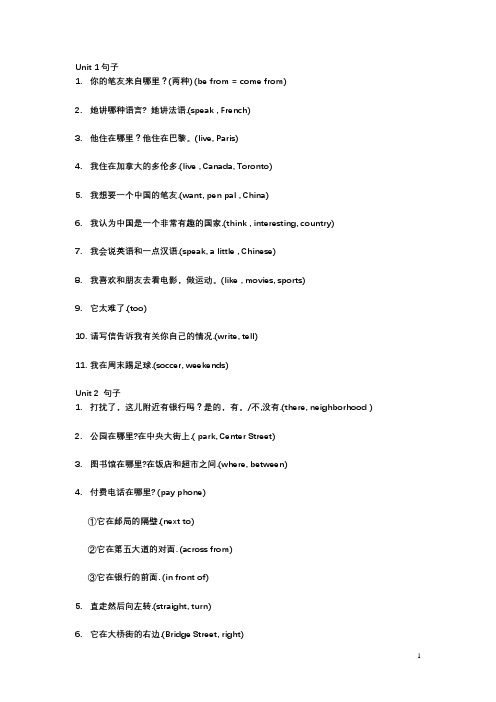
Unit 1句子1.你的笔友来自哪里?(两种) (be from = come from)2.她讲哪种语言? 她讲法语.(speak , French)3.他住在哪里?他住在巴黎。
(live, Paris)4.我住在加拿大的多伦多.(live , Canada, Toronto)5.我想要一个中国的笔友.(want, pen pal , China)6.我认为中国是一个非常有趣的国家.(think , interesting, country)7.我会说英语和一点汉语.(speak, a little , Chinese)8.我喜欢和朋友去看电影,做运动。
(like , movies, sports)9.它太难了.(too)10.请写信告诉我有关你自己的情况.(write, tell)11.我在周末踢足球.(soccer, weekends)Unit 2 句子1.打扰了,这儿附近有银行吗?是的,有。
/不,没有.(there, neighborhood )2.公园在哪里?在中央大街上.( park, Center Street)3.图书馆在哪里?在饭店和超市之间.(where, between)4.付费电话在哪里? (pay phone)①它在邮局的隔壁.(next to)②它在第五大道的对面. (across from)③它在银行的前面. (in front of)5.直走然后向左转.(straight, turn)6.它在大桥街的右边.(Bridge Street, right)7.---非常感谢.---不用谢.(Thanks, welcome)8.在第一大街向左转,就可以欣赏到这城市的安静的街道和小公园.(First Avenue, enjoy )9.散步穿过中央大街的公园。
(walk, through)10.紧挨着旅馆,有一幢有个有趣的花园的小房子。
(next to, house, with, garden )11.这是花园之旅的开始.(beginning, tour)12.大桥街是个玩得开心的好地方.(Bridge Street, fun)13.如果你饿了,可以在超市里买些食物.(if, h, buy, supermarket )14.我知道你下个星期天要来.(know, arrive ,next)15.让我告诉你去我家的路.(the way to )16.从机场打的.(taxi, airport)17.我家就在你的右边.(house, on )18.我希望你旅途愉快!(hope, trip)Unit 3 句子1.让我们先看熊猫吧。
新人教版七年级下册各单元句子翻译(汉语)

新人教版七年级下册各单元句子翻译(汉语)work Information Technology Company.2020YEAR七年级下句子翻译Unit1A部分1、你会下象棋吗?不,我不会。
2、你会弹吉他吗?是的,我会。
3、你想加入什么俱乐部?我想加入美术俱乐部。
4、丽萨想加入游泳俱乐部,但是她不会游泳。
5、鲍勃想加入英语俱乐部。
他喜欢说英语。
6、你会什么运动我会踢足球。
7、他擅长于讲故事,他可以加入讲故事俱乐部。
8、让我们加入运动俱乐部吧。
9、比尔会写故事吗?不,但是他会讲故事。
10、我们想为学校表演招聘一些学生。
11、他弟弟会说英语,但是不是说得很好。
12、我的父亲非常喜欢运动。
他打篮球很好。
B部分1、我喜欢和人们交谈和玩游戏。
2、你对老人好吗你能和他们交谈、玩游戏吗3、我们需要你们帮助说英语的学生做运动。
4、学校需要帮助来教英语。
5、学好英语不是很容易。
6、你会弹钢琴还是拉小提琴?7、你可以参加我们学校的音乐节。
8、我喜欢在放学后与朋友打篮球。
9、请给我打689-7728这个电话。
10、彼得喜欢交朋友。
他想和我交朋友。
Unit2A部分1、你通常什么时间洗漱我通常在6:30洗漱。
2、里克什么时间穿衣服他总是在7:20穿衣服。
3、斯科特什么时候锻炼?他常常在周末锻炼。
4、你的电台节目是什么时间(播出)从晚上的12点到早晨的6点。
5、我通常在6点起床,然后在7点去上班。
我上班从来不迟到。
6、我不喜欢早起床。
7、我没有太多的时间吃早饭,所以我通常吃得很快。
8、放学后,我有时候打半小时的篮球。
9、当我到家的时候,我总是首先做作业。
10、在晚上,我或者看电视或者玩电脑游戏。
11、在晚上她做作业,并且通常散会步。
12、他有一个很健康的生活。
13、他通常从6:15锻炼到7:00。
然后他快速地洗澡,吃早饭。
14、在那之后,他总是刷完牙就去上学。
15、冰淇淋通常尝起来很好,所以学生们都喜欢放学后吃它。
16、你需要在吃完东西后刷牙,以便有一口好牙齿。
新人教版七年级英语下册Unit2句子翻译专项练习
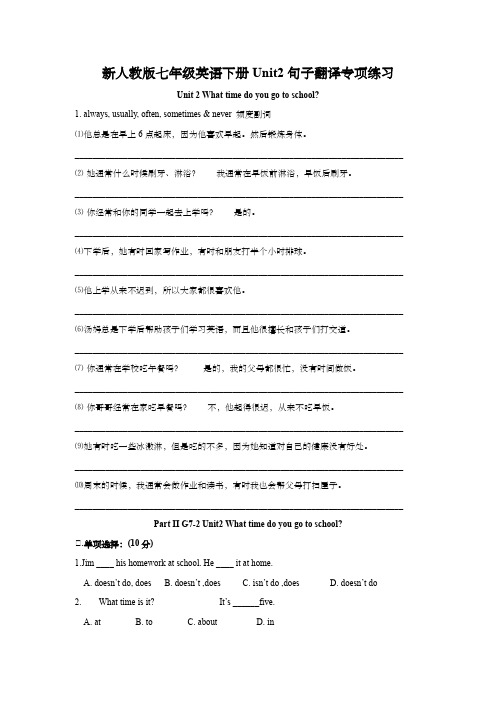
新人教版七年级英语下册Unit2句子翻译专项练习Unit 2 What time do you go to school?1. always, usually, often, sometimes & never 频度副词⑴他总是在早上6点起床,因为他喜欢早起。
然后锻炼身体。
___________________________________________________________________________⑵-她通常什么时候刷牙、淋浴?-我通常在早饭前淋浴,早饭后刷牙。
___________________________________________________________________________⑶-你经常和你的同学一起去上学吗?-是的。
___________________________________________________________________________⑷下学后,她有时回家写作业,有时和朋友打半个小时排球。
___________________________________________________________________________⑸他上学从来不迟到,所以大家都很喜欢他。
___________________________________________________________________________⑹汤姆总是下学后帮助孩子们学习英语,而且他很擅长和孩子们打交道。
___________________________________________________________________________⑺-你通常在学校吃午餐吗?-是的,我的父母都很忙,没有时间做饭。
___________________________________________________________________________⑻-你哥哥经常在家吃早餐吗?-不,他起得很迟,从来不吃早饭。
七年级英语下册unit2wearegoingtowalkupthegreatwall

【结论】 1. because是从属连词,意为“因为”,
表示原因。常用来回答由疑问词 w__h_y_引导的特殊疑问句。 2. because与so可以用来表示因果关系, because意为“因为”,so意为“因 此,所以”,但在英语的语法中它们 不能同时用在一个句子中,如例句 ____B_____。
Hong Kong 香港
We’re looking forward to the Dragon Boat Festival.
Read the passage again and answer the questions.
1. Why is Helen going to visit her granddaughter?
because I want to help mother do some housework. 表示“打扫卫生”。 在英语中,通常可以在do后加上v.ing形式,表示“做……事”;并且 在v.-ing形式前面一般有个限定词 (通常为some)。
例如:
do some sightseeing /washing 观光 / 洗衣服 另外, 英语中还经常用go + doing表示 “去……”。例如: go swimming / shopping 去游泳 / 购物
随堂练习
请根据括号内的要求完成下列句子。 1. Marry is going to do her homework. (改为否定句) Marry i_s_n_’_t _g_o_in_g_ to do his homework. 2. She is going to review her lesson this evening. (改
人教版七年级下册unit 2 短语归纳
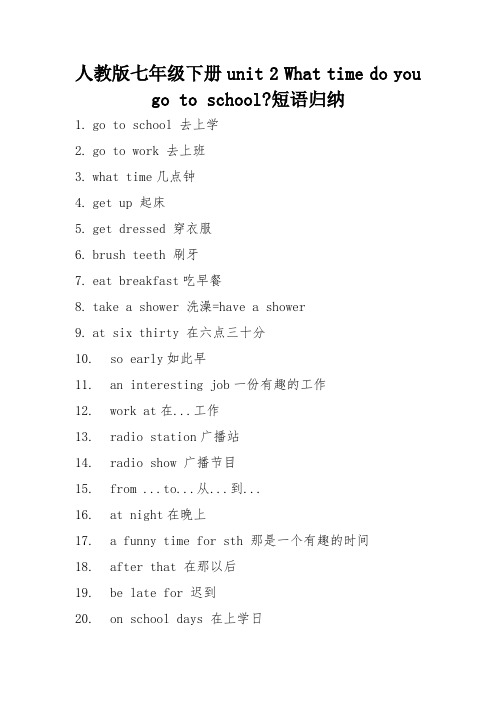
人教版七年级下册unit 2 What time do you go to school?短语归纳1.go to school 去上学2.go to work 去上班3.what time几点钟4.get up 起床5.get dressed 穿衣服6.brush teeth 刷牙7.eat breakfast吃早餐8.take a shower 洗澡=have a shower9.at six thirty 在六点三十分10.so early如此早11.an interesting job一份有趣的工作12.work at在...工作13.radio station广播站14.radio show 广播节目15.from ...to...从...到...16.at night在晚上17. a funny time for sth 那是一个有趣的时间18.after that 在那以后19.be late for 迟到20.on school days 在上学日21.your best friend 你的做好的朋友22.interview sb 采访某人23.give a report 作报告24.on weekends 在周末=at weekends25.eat dinner 吃饭26.half past six 六点半27. a quarter past three 三点十五28. a quarter to seven 六点四十五29.in the morning 在早上30.in the afternoon 在下午31.in the evening在晚上32.do homework 做作业33.go to bed 去睡觉34.go home 回家35.clean one’s room打扫房间36.take a walk 散步=have a walk=go for a walk37.my last question 我的最后一个问题38.eat quickly 迅速地吃39.eat vegetables 吃蔬菜40.get home 到家41.either...or...或者..或者42.eat a good breakfast 吃一顿丰盛的早餐43.lots of=a lot of 许多44.taste good 尝起来不错45.unhealthy habits 不健康的习惯46.have a healthy life 有一种健康的生活47.make breakfast for 为某人做早餐48.the first class 第一节课。
七年级英语下人教版 Unit 2 例句讲解
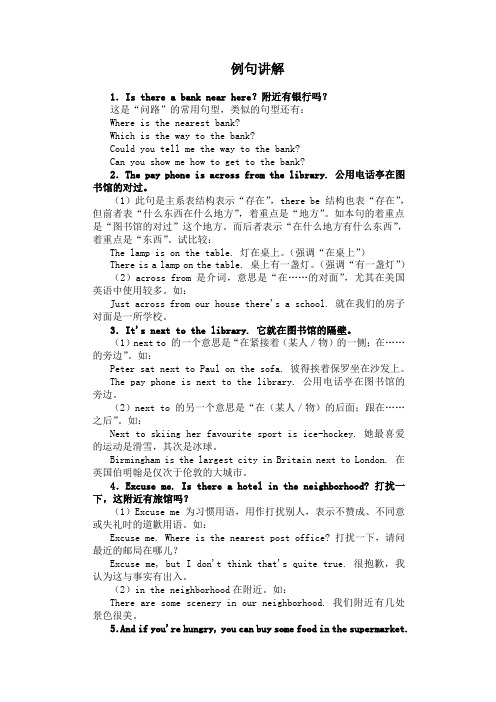
例句讲解1.Is there a bank near here?附近有银行吗?这是“问路”的常用句型,类似的句型还有:Where is the nearest bank?Which is the way to the bank?Could you tell me the way to the bank?Can you show me how to get to the bank?2.The pay phone is across from the library. 公用电话亭在图书馆的对过。
(1)此句是主系表结构表示“存在”,there be 结构也表“存在”,但前者表“什么东西在什么地方”,着重点是“地方”。
如本句的着重点是“图书馆的对过”这个地方。
而后者表示“在什么地方有什么东西”,着重点是“东西”。
试比较:The lamp is on the table. 灯在桌上。
(强调“在桌上”)There is a lamp on the table. 桌上有一盏灯。
(强调“有一盏灯”)(2)across from 是介词,意思是“在……的对面”,尤其在美国英语中使用较多。
如:Just across from our house there's a school. 就在我们的房子对面是一所学校。
3.It's next to the library. 它就在图书馆的隔壁。
(1)next to 的一个意思是“在紧接着(某人/物)的一侧;在……的旁边”。
如:Peter sat next to Paul on the sofa. 彼得挨着保罗坐在沙发上。
The pay phone is next to the library. 公用电话亭在图书馆的旁边。
(2)next to 的另一个意思是“在(某人/物)的后面;跟在……之后”。
如:Next to skiing her favourite sport is ice-hockey. 她最喜爱的运动是滑雪,其次是冰球。
七下Unit2 课文翻译
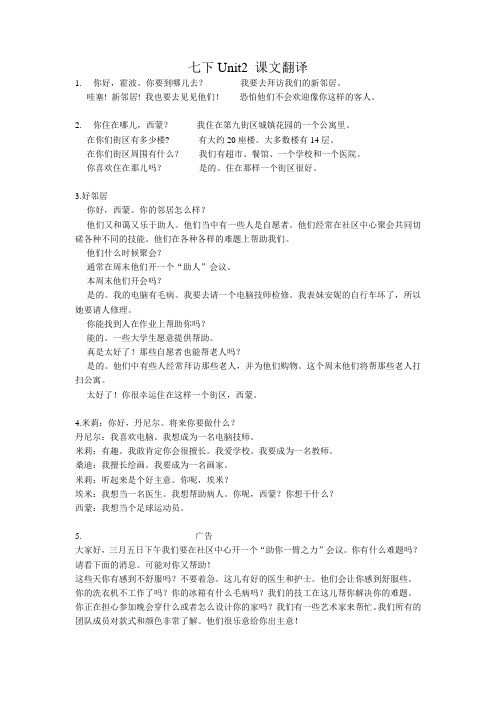
七下Unit2 课文翻译1.----你好,霍波。
你要到哪儿去?----我要去拜访我们的新邻居。
----哇塞! 新邻居! 我也要去见见他们!----恐怕他们不会欢迎像你这样的客人。
2.----你住在哪儿,西蒙?----我住在第九街区城镇花园的一个公寓里。
----在你们街区有多少楼? ----有大约20座楼。
大多数楼有14层。
----在你们街区周围有什么?----我们有超市、餐馆、一个学校和一个医院。
----你喜欢住在那儿吗?----是的。
住在那样一个街区很好。
3.好邻居----你好,西蒙。
你的邻居怎么样?----他们又和蔼又乐于助人。
他们当中有一些人是自愿者。
他们经常在社区中心聚会共同切磋各种不同的技能。
他们在各种各样的难题上帮助我们。
----他们什么时候聚会?----通常在周末他们开一个“助人”会议。
----本周末他们开会吗?----是的。
我的电脑有毛病。
我要去请一个电脑技师检修。
我表妹安妮的自行车坏了,所以她要请人修理。
----你能找到人在作业上帮助你吗?----能的。
一些大学生愿意提供帮助。
----真是太好了!那些自愿者也能帮老人吗?----是的。
他们中有些人经常拜访那些老人,并为他们购物。
这个周末他们将帮那些老人打扫公寓。
----太好了!你很幸运住在这样一个街区,西蒙。
4.米莉:你好,丹尼尔。
将来你要做什么?丹尼尔:我喜欢电脑。
我想成为一名电脑技师。
米莉:有趣。
我敢肯定你会很擅长。
我爱学校。
我要成为一名教师。
桑迪:我擅长绘画。
我要成为一名画家。
米莉:听起来是个好主意。
你呢,埃米?埃米:我想当一名医生。
我想帮助病人。
你呢,西蒙?你想干什么?西蒙:我想当个足球运动员。
5. 广告大家好,三月五日下午我们要在社区中心开一个“助你一臂之力”会议。
你有什么难题吗?请看下面的消息。
可能对你又帮助!这些天你有感到不舒服吗?不要着急。
这儿有好的医生和护士。
他们会让你感到舒服些。
你的洗衣机不工作了吗?你的冰箱有什么毛病吗?我们的技工在这儿帮你解决你的难题。
初中英语七年级下册 Unit 2 Section B 2b 参考译文
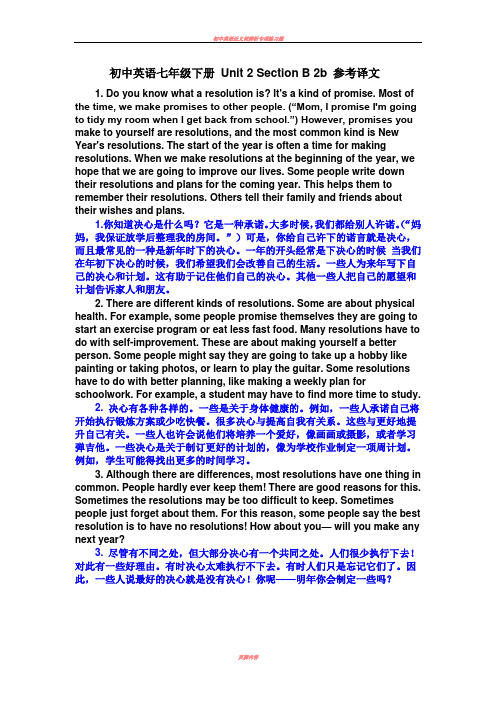
初中英语近义词辨析专项练习题初中英语七年级下册Unit 2 Section B 2b 参考译文1. Do you know what a resolution is? It's a kind of promise. Most of the time, we make promises to other people. (“Mom, I promise I'm going to tidy my room when I get back from school.”) However, promises you make to yourself are resolutions, and the most common kind is New Year's resolutions. The start of the year is often a time for making resolutions. When we make resolutions at the beginning of the year, we hope that we are going to improve our lives. Some people write down their resolutions and plans for the coming year. This helps them to remember their resolutions. Others tell their family and friends about their wishes and plans.1.你知道决心是什么吗?它是一种承诺。
大多时候,我们都给别人许诺。
(“妈妈,我保证放学后整理我的房间。
”)可是,你给自己许下的诺言就是决心,而且最常见的一种是新年时下的决心。
一年的开头经常是下决心的时候当我们在年初下决心的时候,我们希望我们会改善自己的生活。
(完整word版)人教版七年级下册英语1-12单元重点句子翻译
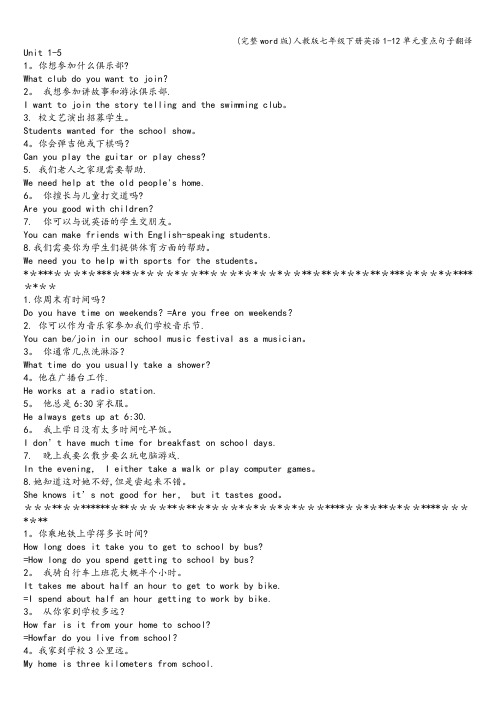
Unit 1-51。
你想参加什么俱乐部?What club do you want to join?2。
我想参加讲故事和游泳俱乐部.I want to join the story telling and the swimming club。
3. 校文艺演出招募学生。
Students wanted for the school show。
4。
你会弹吉他或下棋吗?Can you play the guitar or play chess?5. 我们老人之家现需要帮助.We need help at the old people's home.6。
你擅长与儿童打交道吗?Are you good with children?7. 你可以与说英语的学生交朋友。
You can make friends with English-speaking students.8.我们需要你为学生们提供体育方面的帮助。
We need you to help with sports for the students。
*******************************************************************1.你周末有时间吗?Do you have time on weekends?=Are you free on weekends?2. 你可以作为音乐家参加我们学校音乐节.You can be/join in our school music festival as a musician。
3。
你通常几点洗淋浴?What time do you usually take a shower?4。
他在广播台工作.He works at a radio station.5。
他总是6:30穿衣服。
He always gets up at 6:30.6。
我上学日没有太多时间吃早饭。
人教版初中英语七年级下册Unit2SectionB教材全解
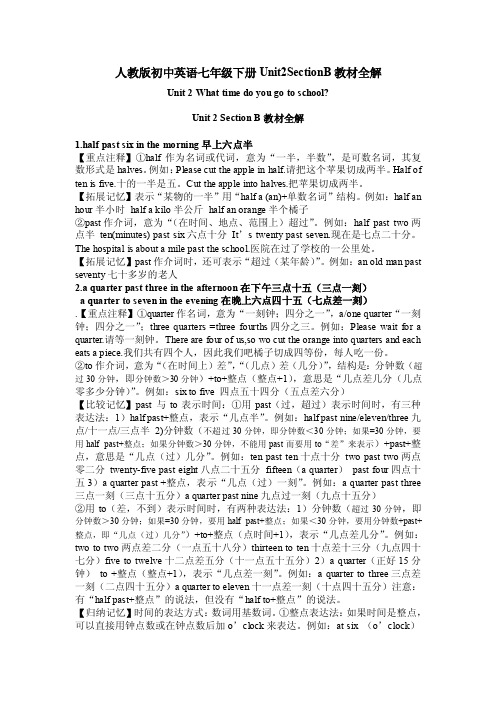
人教版初中英语七年级下册Unit2SectionB教材全解Unit 2 What time do you go to school?Unit 2 Section B教材全解1.half past six in the morning早上六点半【重点注释】①half作为名词或代词,意为“一半,半数”,是可数名词,其复数形式是halves。
例如:Please cut the apple in half.请把这个苹果切成两半。
Half of ten is five.十的一半是五。
Cut the apple into halves.把苹果切成两半。
【拓展记忆】表示“某物的一半”用“half a (an)+单数名词”结构。
例如:half an hour半小时half a kilo半公斤half an orange半个橘子②past作介词,意为“(在时间、地点、范围上)超过”。
例如:half past two两点半ten(minutes) past six六点十分It’s twenty past seven.现在是七点二十分。
The hospital is about a mile past the school.医院在过了学校的一公里处。
【拓展记忆】past作介词时,还可表示“超过(某年龄)”。
例如:an old man past seventy七十多岁的老人2.a quarter past three in the afternoon在下午三点十五(三点一刻)a quarter to seven in the evening在晚上六点四十五(七点差一刻).【重点注释】①quarter作名词,意为“一刻钟;四分之一”,a/one quarter“一刻钟;四分之一”;three quarters =three fourths四分之三。
例如:Please wait for a quarter.请等一刻钟。
There are four of us,so wo cut the orange into quarters and each eats a piece.我们共有四个人,因此我们吧橘子切成四等份,每人吃一份。
人教版七年级下册Unit 2 分课时课文听力+翻译

人教版七年级下册Unit 2 分课时课文听力+翻译UNIT 2 What time do you go to school?Section A1b Listen and match the times with the actions. Draw lines from the clocks to the pictures.听录音,把时间和动作匹配起来。
在时钟和图画之间画线。
What time do you usually get up, Rick?Um, I usually get up at six thirty.And what time do you brush your teeth and take a shower?I brush your teeth and take a shower at six forty.Hmm. What time do you eat breakfast?Seven o’clock.And what time do you usually get dressed?I usually get dressed at seven twenty.And my last question. What time do you go to school?I usually go to school at seven thirty.Thank you.瑞克,你通常几点起床?嗯,我通常六点半起床。
你什么时候刷牙和洗澡?我6点40给你刷牙和洗澡。
嗯。
你什么时候吃早餐?7点钟。
你通常什么时候穿衣服?我通常在7点20穿衣服。
最后一个问题。
你什么时候去上学?我通常七点半去上学。
谢谢你!2a Listen to the conversation and complete the sentences.听对话,完成句子。
You have a big family, don’t you, Jim?Yes, I have two brothers and two sisters.Wow! How many showers do you have?We only have one shower.Is that difficult?No, because we have a shower schedule. My brother Bob takes a shower first at five thirty.Wow! That’s early!Yeah. Then my sister Mary takes a shower at five fifty. Next my brother Jack takes a shower at six fifteen. I take the shower at six thirty. My sister Anna at six forty-five…你有一个大家庭,是吗,吉姆?有,我有两个兄弟和两个姐妹。
七年级下册英语第二单元重点句子

七年级下册英语第二单元重点句子Unit 2: My School Day。
In this unit, we will learn about daily routines and activities in school. Let's explore some key sentences that will help us communicate about our school day.1. I usually get up at 6:30 in the morning.This sentence tells us about the speaker's usual waking up time. It is important to have a regular routine to start the day.2. I have breakfast at 7:00.Having a nutritious breakfast is essential for a productive day at school. It provides us with the energy we need to concentrate and learn.3. I leave for school at 7:30.The time we leave for school is crucial to ensure we arrive on time. Punctuality is important and shows respect for our education.4. I arrive at school at 8:00.Arriving at school on time allows us to settle in, prepare for the day, and socialize with our classmates before classes begin.5. My first class starts at 8:30.The start time of our first class may vary depending on the school. It is essential to be attentive and ready to learn from the beginning.6. We have four classes in the morning and two in the afternoon.Knowing the schedule of our classes helps us plan our day and manage our time effectively. It is important to be organized and prepared for each class.7. We have a break at 10:00 for fifteen minutes.Taking short breaks between classes allows us to relax, recharge, and socialize with our friends. It is important to use this time wisely and not get distracted.8. We have lunch at 12:00.Lunchtime is an opportunity to refuel our bodies and socialize with our classmates. It is important to have a balanced meal to maintain our energy levels throughout the day.9. After lunch, we have a sports class.Participating in sports activities helps us stay fit and healthy. It also promotes teamwork and cooperation among students.10. School finishes at 3:30 in the afternoon.The end of the school day marks the completion of our academic responsibilities. It is important to make the most of our time in school and complete all assigned tasks.11. After school, I usually do my homework.Completing homework allows us to reinforce what we have learned in class. It is important to develop good study habits and manage our time effectively.12. In the evening, I spend time with my family.Spending quality time with our family helps us relax and maintain a healthy work-life balance. It is important to prioritize our relationships outside of school.13. I go to bed at 10:00.Getting enough sleep is essential for our overall well-being and academic performance. It is important to establish a consistent bedtime routine.These key sentences provide us with a glimpse into a typical school day. By following a routine and managing our time effectively, we can make the most of our education and achieve our goals. Remember, a successful school day starts with a positive mindset and a commitment to learning.。
初中英语七年级下册unit2sectionb2b参考译文
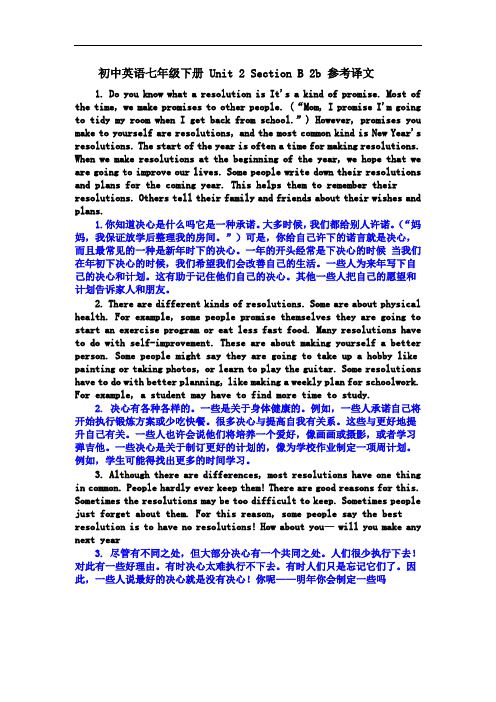
初中英语七年级下册 Unit 2 Section B 2b 参考译文1. Do you know what a resolution is It's a kind of promise. Most of the time, we make promises to other people. (“Mom, I promise I'm going to tidy my room when I get back from school.”) However, promises you make to yourself are resolutions, and the most common kind is New Year's resolutions. The start of the year is often a time for making resolutions. When we make resolutions at the beginning of the year, we hope that we are going to improve our lives. Some people write down their resolutions and plans for the coming year. This helps them to remember their resolutions. Others tell their family and friends about their wishes and plans.1.你知道决心是什么吗它是一种承诺。
大多时候,我们都给别人许诺。
(“妈妈,我保证放学后整理我的房间。
”)可是,你给自己许下的诺言就是决心,而且最常见的一种是新年时下的决心。
一年的开头经常是下决心的时候当我们在年初下决心的时候,我们希望我们会改善自己的生活。
Unit2单元知识点总结人教版七年级英语下册
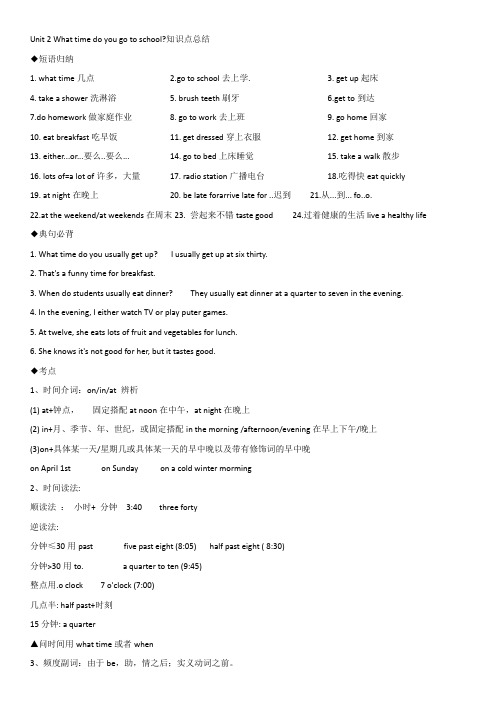
Unit 2 What time do you go to school?知识点总结◆短语归纳1. what time几点2.go to school去上学.3. get up起床4. take a shower洗淋浴5. brush teeth刷牙6.get to到达7.do homework做家庭作业8. go to work去上班9. go home回家10. eat breakfast吃早饭11. get dressed穿上衣服12. get home到家13. either...or...要么..要么... 14. go to bed上床睡觉15. take a walk散步16. lots of=a lot of许多,大量17. radio station广播电台18.吃得快eat quickly 19. at night在晚上20. be late forarrive late for ..迟到21.从...到... fo..o.22.at the weekend/at weekends在周末23. 尝起来不错taste good 24.过着健康的生活live a healthy life◆典句必背1. What time do you usually get up? I usually get up at six thirty.2. That's a funny time for breakfast.3. When do students usually eat dinner? They usually eat dinner at a quarter to seven in the evening.4. In the evening, I either watch TV or play puter games.5. At twelve, she eats lots of fruit and vegetables for lunch.6. She knows it's not good for her, but it tastes good.◆考点1、时间介词:on/in/at 辨析(1) at+钟点,固定搭配at noon在中午,at night在晚上(2) in+月、季节、年、世纪,或固定搭配in the morning /afternoon/evening在早上下午/晚上(3)on+具体某一天/星期几或具体某一天的早中晚以及带有修饰词的早中晚on April 1st on Sunday on a cold winter morming2、时间读法:顺读法:小时+ 分钟3:40 three forty逆读法:分钟≤30用past five past eight (8:05) half past eight ( 8:30)分钟>30用to. a quarter to ten (9:45)整点用.o clock 7 o'clock (7:00)几点半: half past+时刻15分钟: a quarter▲问时间用what time或者when3、频度副词:由于be,助,情之后;实义动词之前。
人教英语七下UNIT 2课文中翻英

UNIT 2 Section A1a:里克,你通常几点起床?我通常六点半起床。
1c:里克,你通常几点洗淋浴?我通常六点四十洗淋浴。
2d:斯哥特有一份有趣的工作。
他在一家广播电台工作。
斯科特,你的广播节目在几点?从晚上十二点到早上六点。
你通常几点起床?晚上八点半。
然后我九点吃早饭。
那是个有趣的早饭的时间。
是的。
之后,我通常在十点二十左右锻炼。
你什么时候去上班?在十一点,所以的工作从不迟到。
Grammar focus你通常几点起床?我通常六点三十起床。
你们几点穿衣服?他们总是在七点二十穿衣服。
里克几点吃早饭?他七点吃早饭。
斯科特什么时候去工作?他总是在十一点去工作,他从不迟到。
你的朋友们什么时候锻炼?他们通常在周末锻炼。
Section B:2b:你好,我是Tony,我不喜欢早起床。
在早上,我八点起床。
然后,我在八点三十去上学。
我没有许多时间吃早饭,因此,我通常吃的非常快。
午饭我通常吃汉堡。
放学后,我有时打半小时篮球。
当我到家的时候,我总是先做作业。
在晚上,我要么看电视,要么玩电脑游戏。
在十点三十,我刷牙,然后上床睡觉。
Mary是我的妹妹。
她通常在六点半起床。
然后她总是洗淋浴,吃丰盛的早饭。
然后,她在八点三十去上学。
在十二点,她吃许多水果和蔬菜作为午饭。
午饭后,她有时打排球。
她总是在晚饭后吃冰激凌。
她知道那对她不好,但冰激凌尝起来好极了!在晚上,她做家庭作业,通常还要游泳或者散步。
在九点三十,她上床睡觉。
- 1、下载文档前请自行甄别文档内容的完整性,平台不提供额外的编辑、内容补充、找答案等附加服务。
- 2、"仅部分预览"的文档,不可在线预览部分如存在完整性等问题,可反馈申请退款(可完整预览的文档不适用该条件!)。
- 3、如文档侵犯您的权益,请联系客服反馈,我们会尽快为您处理(人工客服工作时间:9:00-18:30)。
Unit 2
Unit2 Everyday Exercise for the First Day
1.你什么时候洗澡?-早上七点一刻。
(take)
2.玛丽通常放学后和她的同学们一起弹吉他。
(usually)
3.我的堂哥从来不吃冰淇淋因为他不想变胖。
(eat)
4.我能问你一些关于你学校的情况吗?(ask)
5.对于老人来说早起是健康的(get)
Unit 2 Everyday exercise for the second day
1. 你最好的朋友通常什么时候上学?(usually)
2. 汤姆在敬老院有个有趣的工作。
(interest)
3. 从早上八点到下午六点过十分他有很多工作要做。
(from...to...)
4. 他在广播电台工作。
(work)
5. 我父母上班从不迟到。
(never)
Unit 2 Everyday exercise for the third day
1. Tony通常在7:45穿戴整齐。
(quarter)
2. 在上学的日子我上课从不迟到。
(late)
3. 一群男孩在午饭后踢足球。
(group)
4. 周末我从来不起那么早。
(early)
5. Lisa有一份好工作,她每天没有很多事要做。
(job, work)
Unit2 Everyday Exercise for the Fourth Day
1.学生们一般什么时候吃早餐?(time)
2.他们通常在早上七点二十五分吃早餐(usually)
3.我想了解你的一天作息。
(about)
4.麦克晚上一般做些什么?(do)
5.我晚上睡得很早,所以我早上能起很早。
(early)
Unit2 Everyday Exercise for the Fifth Day
1. 他总是早起早睡。
这是一个好习惯。
(get)
2. 他知道吃冰淇淋对他来说是毫无益处的。
(know)
3. 我没有时间吃早餐,所以我通常吃地很快。
(quickly)
4. 她每天早上洗澡,刷牙,晚饭后散步。
(take)
5. 我喜欢吃水果,因为水果尝起来很美味。
(taste)
Unit 2 Everyday exercise for the sixth day
1、每天晚上,我要么读书,要么写作业。
2、我总是6:00到6:40锻炼。
3、早睡早起对我们的健康有好处。
4、这沙发摸上去舒服、柔软。
5、星期一到星期五,我没有时间打扫房间。
